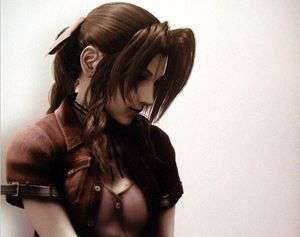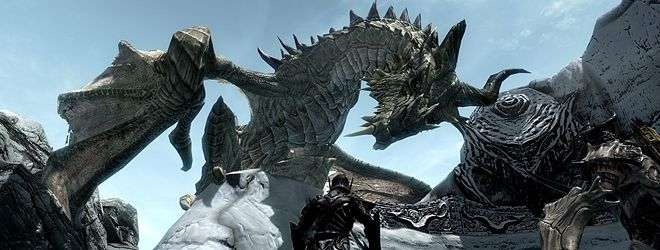If Music Be The Food Of Love, Game On
by Adam R
 A few years back, a friend of mine was helping me power through the campaign of Halo 2. Close to the end of it there’s a certain point when the alien collective arrayed against mankind breaks apart and a civil war erupts. The player is stuck on board a space station which, as it turns out, is ground zero for the oncoming war. As little aliens scramble toward bigger ones for protection, lines are quickly drawn in the sand and the player is thrust in the middle of two groups of hostile enemies that both have highly advanced weaponry and anger issues. My comrade and I eventually came to a large room where very large angry aliens with very large dangerous guns were having it out.
A few years back, a friend of mine was helping me power through the campaign of Halo 2. Close to the end of it there’s a certain point when the alien collective arrayed against mankind breaks apart and a civil war erupts. The player is stuck on board a space station which, as it turns out, is ground zero for the oncoming war. As little aliens scramble toward bigger ones for protection, lines are quickly drawn in the sand and the player is thrust in the middle of two groups of hostile enemies that both have highly advanced weaponry and anger issues. My comrade and I eventually came to a large room where very large angry aliens with very large dangerous guns were having it out.
Our initial reaction was to simply hang back and let these two factions have at each until they were weak enough where we could just pick off the couple of survivors. While initially a sound plan, it completely changed within a few seconds once the music came in. Amid distorted metal guitar riffs and powerful drum backing, and caught up in the energy of the moment, we looked one another in the eye and, in unison, exclaimed to each other “Let’s do this!”
While we did end up making it out of there alive, reflecting on this kind of moment got me thinking that the background music in games in really a powerful motivator, even if it’s one that we hardly pay any attention to usually. Honestly, I think most of the games we consider great wouldn’t be so if it wasn’t for their music score. It takes a lot of work to score something that would fit into an interactive experience of a game and make it work.
 Think of your favorite movie and how well the music works with what’s on the screen. Usually, the musical scores fit because the compositions are generally written after filming so all on screen cues are synced up to what we are hearing. Imagine how difficult this must be for a game composer, because if game music was done this way we may not get to the exact part they expected us to be at and that sharp collection of strings that was supposed to scare the crap out of us when that monster popped out ended up doing nothing at all. Thankfully we don’t have to worry about things like this, as games like Dead Space and Resident Evil have their musical timing on par with those of the greatest slasher movies. Random steam pipe ruptures help too.
Think of your favorite movie and how well the music works with what’s on the screen. Usually, the musical scores fit because the compositions are generally written after filming so all on screen cues are synced up to what we are hearing. Imagine how difficult this must be for a game composer, because if game music was done this way we may not get to the exact part they expected us to be at and that sharp collection of strings that was supposed to scare the crap out of us when that monster popped out ended up doing nothing at all. Thankfully we don’t have to worry about things like this, as games like Dead Space and Resident Evil have their musical timing on par with those of the greatest slasher movies. Random steam pipe ruptures help too.
As opposed to simply accenting whatever is going on screen, music is commonly used in games to create a mood or add to an atmosphere. I couldn’t tell you how much more enjoyable it is to climb to the top of a mountain in Skyrim and have my arrival announced by a choir of soft voices and floaty strings. And how quickly that all turns around with the heavy percussion and staccato chanting of a male voice ensemble as a dragon comes swooping down on my head. It also helps to illuminate the contrast in similar situations, such as in Assassin’s Creed keeping to light airy notes to highlight the mystery and awe of actually being transported backwards in time, to the fast percussion and swarm of string instruments to give chase scenes that extra something. Even taking the ‘less is more’ approach, the slow piano following Kat’s death in Halo: Reach speaks volumes of emotion that you just wouldn’t expect from a game featuring a fully masked protagonist, let alone a FPS which are often lacking in the narrative department. Even the lack of music can impact you in ways you wouldn’t believe, and it’s exactly this method that shoots LIMBO way up there on the creepiness charts.
Of course there are those musical moments that exists as part of the game experience but somehow live just outside of the game itself. While admittedly cheesy, I can’t listen to either J-Pop tunes featured in Kingdom Hearts 1 or 2 without feeling nostalgic for those days I spent in my youth tearing baddies up with a giant key alongside all-stars from the Disney-verse. Of course, we all remember when we heard the disembodied voice of GLaDOS sing us out of the original Portal which quickly became one of the greatest moments in recent game history and a theme song of sorts.
 There are also those few pieces of music that exist on their own in a different way and, upon their first notes being produced, are instantly recognized. The intro of the Super Mario Brothers has graced many a phone as a ringtone, including my own. Should the Zelda overture happen to grace my iPod as I’m driving, my daily commute suddenly takes a turn toward being epic in itself and to this day I cannot listen to “The Flower Girl” from Final Fantasy VII in public because it never fails that I shed a tear or two.
There are also those few pieces of music that exist on their own in a different way and, upon their first notes being produced, are instantly recognized. The intro of the Super Mario Brothers has graced many a phone as a ringtone, including my own. Should the Zelda overture happen to grace my iPod as I’m driving, my daily commute suddenly takes a turn toward being epic in itself and to this day I cannot listen to “The Flower Girl” from Final Fantasy VII in public because it never fails that I shed a tear or two.
So next time you feel yourself being sucked into a game, take a second to see what it is that’s causing it. Turn up the volume, and see what gifts a hard working composer has left you.
Last five articles by Adam R
- Injustice: Gods Among Us - E3 Preview
- Halo 4 - E3 Preview
- If Music Be The Food Of Love, Game On
- RIP to Shreds
- Lost In Oblivion





















Whilst I don’t make a habit of listening to soundtracks outside of the games they are designed for, I do instantly notice a lacklustre soundtrack or one that’s outstanding. I totally agree that music is incredibly important to emotionally engaging the player – the right sound at the right time can be enough to send shivers up your spine or have you on the edge of the seat.
What I love is when a piece of music runs throughout a trilogy, even if just a jingle, then the first time you put in a new installment and hear that sound you already feel at home with it – like pressing start on the Mass Effect 3 menu, the first time I heard that ‘booop’ I was immediately thrown into a heady mix of joy for something new and fondness of returning to the series.
Nice piece, Adam.
I have to admit that I differ from Stu: there are some soundtracks I love nothing more than sitting down and listening to outside of the game itself. I genuinely feel that it’s getting to the point where music in games is easily surpassing that found in other media, and this article is a good example of why
I massively enjoyed this piece, as I believe that the score is so very important to a game, but, sadly, so often overlooked. I don’t think some folk honestly notice the music, but then I suppose we wouldn’t sometimes unless it were suddenly no longer there. Only recently, there was a campaign to get video game music into the ClassicFM Hall of Fame, and we have been supporting it by running a couple of news pieces – game music deserves to be up there with some of the greats from film and other media.
As far as games go, my heart leaps every time I hear the opening music to Oblivion – not just because it is such a rousing, wonderful piece of music, but also because it plugs me back into many, many great hours spent happily playing. Other games would be nothing without the score – the atmosphere of games such as Black Mirror 2 and 3, Gray Matter, and Amnesia that I have played in recent times often hinged on the score as much as anything else. Amnesia is actually the perfect example of this as the audio was crucial in delivering an atmosphere of fear and tension that you could slice with a blood-stained knife.
Songs from games are also a fantastic part of the whole experience for me – Portal, as you mentiond is a great example, but also the adventure game Gray Matter has vocal tracks that are lovely. Mirror’s Edge is another one. I’m getting carried away now! Great read, Adam.